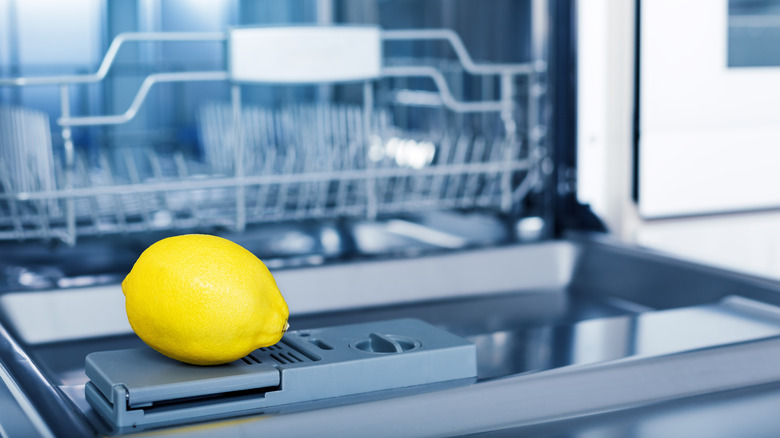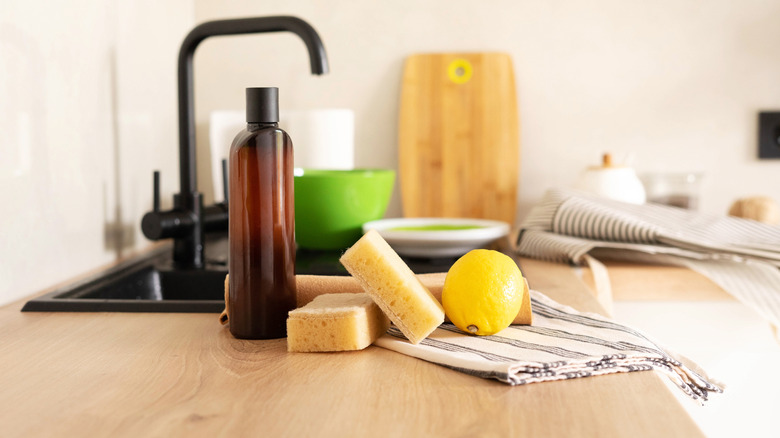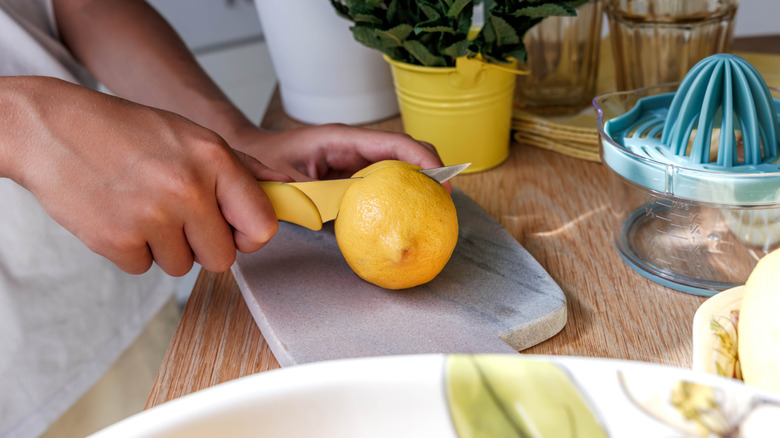How A Lemon Keeps Your Dishes And Dishwasher Fresh
If you're one of those people who can't stand a pile of dirty dishes, you're absolutely not alone. Chances are, you've probably spent hours wandering the aisles, searching for the best dishwasher detergents, yet no matter how much money you spend, those hard water stains just won't go away. Never mind those lingering odors. You've likely even double-checked that you're not making any of the mistakes everyone makes while loading a dishwasher. Ultimately, you end up more frustrated than ever, wondering if those dishes will ever look spotless again.
But, fear not, the solution might be far simpler and much more affordable than you think. In fact, it might already be waiting inside your fridge. This might come as a surprise, but a lemon could be the ultimate cleaning champ and the solution to all your dishwasher trouble.
Sure, as far as food goes, you're probably familiar with how grilled lemons make better cocktails, or how you can save lemon peels to make Jell-O shots. But the real magic with the lemon lies in one of its key compounds, and that is citric acid. This organic substance isn't just a great flavoring agent and preservative, but it also has the power to make your dishes shine and sparkle, leaving them looking brand new and feeling perfectly fresh.
How are lemons so great at cleaning?
According to the United States Geological Survey (USGS), water hardness is the concentration of magnesium and calcium minerals present in your water. The higher the amount, the harder the water. And dealing with hard water in your dishwasher can be quite a challenge. Not only does your dishwasher get clogged by the accumulation of these mineral deposits, but it also struggles to run efficiently as detergents become less effective. This ultimately leaves your dishwasher smelly, and your glassware cloudy — and only partially clean.
Thankfully, though, the citric acid present in lemon juice is a great fix for that mineral buildup because it breaks it down. Additionally, the essential oil in lemon peels is rich in D-limonene, a compound known to be a gentle, yet powerful degreaser. It's actually so effective, that even graffiti doesn't stand a chance against it.
Alternatively, if you're out of lemons, limes can make an excellent substitute. But no matter which citrus you use, it won't help much if you're not regularly cleaning your dishwasher filter. So remember to clean it thoroughly at least once a month in order to make sure everything runs smoothly.
How to add lemons to your dishwasher cycle
The process of adding a lemon to your dishwasher's cycle isn't rocket science. All you have to do is grab a lemon and your preferred kitchen knife, and slice it in half before you put both of the halves on your dishwasher's top rack next to your dirty dishes. To achieve the best results and to protect the machine from potential damage, it's wise to stick to just a couple of lemon halves, rather than filling it with too many of them. Also, never forget to take the seeds out, as the last thing you want is your dishwasher getting even more clogged than it already was.
After that's done, the only thing left to do is hit the start button and let your dishwasher do the rest as you chill with the latest episode of your favorite TV show. When your dishwasher is done and you open it, you'll likely be amazed at the incredible burst of freshness. Finally, you can also say goodbye to that frustrating glass cloudiness, and ditch those pricey, good-for-nothing salts and rinsing aids once and for all.


